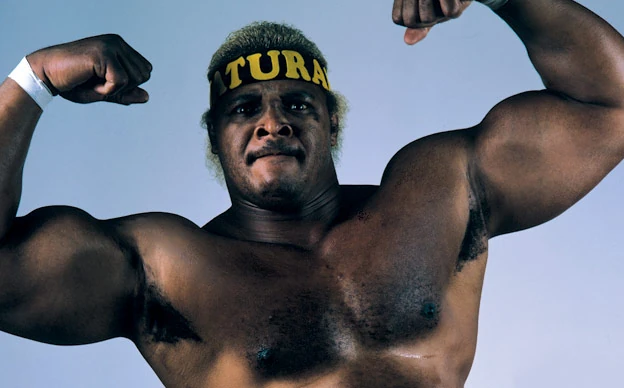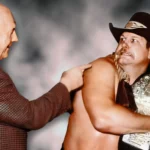Get ready to step into the world of Butch Reed, a legendary wrestler who made waves in the squared circle and beyond. His story is one of triumphs and tribulations, leaving a lasting impact on the world of sports entertainment. In this article, we’ll uncover the real Butch Reed, the man behind the wrestling persona, and explore the fascinating journey he took both in and out of the ring.
Facts About Butch Reed
Butch Reed wasn’t just a wrestler; he was a force of nature. Before stepping into the ring, he was a college football star at the University of Central Missouri. This background likely helped him build an incredible amount of strength and athleticism, qualities that would later make him a legend in the world of professional wrestling.
Born on July 11, 1954, Bruce Franklin Reed’s journey began in Warrensburg, Missouri. His athletic prowess was evident early on, leading him to excel in college football. In 1976, he even briefly joined the Kansas City Chiefs as an undrafted rookie free agent. However, fate had other plans for Reed, eventually guiding him toward the electrifying realm of professional wrestling.
Under the tutelage of renowned trainer Ronnie Etchison, Reed embarked on his wrestling career in 1978. He quickly rose through the ranks, captivating audiences with his raw power and undeniable charisma. His early career saw him adopt the moniker “Hacksaw” Butch Reed, a testament to his aggressive style and relentless determination.
Reed’s signature power moves and captivating presence quickly made him a fan favorite. He possessed a unique blend of speed and agility rarely seen in wrestlers of his size, making every match a spectacle to behold. This rare combination, along with his natural ability to connect with the audience, earned him the moniker “The Natural,” a title that perfectly encapsulated his innate talent and ring presence.
Reed’s career reached new heights in the mid-1980s when he joined Mid-South Wrestling, a promotion known for its gritty, realistic style. It was here that he engaged in legendary feuds with icons like Ric Flair and Jim Duggan, further solidifying his status as a top contender. He even teamed up with the charismatic Junkyard Dog, creating a formidable duo that left a lasting impact on tag team wrestling.
His journey eventually led him to the World Wrestling Federation (WWF) in 1986. Managed by the flamboyant “Doctor of Style” Slick, Reed aimed to dominate the competition. While his WWF tenure didn’t reach the same heights as other periods in his career, he still participated in memorable matches, including competing in the inaugural Survivor Series main event in 1987.
In 1989, Reed embarked on a new chapter, joining World Championship Wrestling (WCW). It was here that he would achieve legendary status as part of the formidable tag team Doom alongside Ron Simmons. Managed by the enigmatic Woman, Doom struck fear into the hearts of their opponents, eventually dethroning the Steiner Brothers to become WCW World Tag Team Champions. This victory cemented their place in wrestling history as one of the most dominant tag teams of their era.
Following his WCW departure, Reed continued to compete on the independent circuit, showcasing his enduring talent and passion for the sport. He wrestled until his retirement in 2001, leaving behind a legacy etched in wrestling history. Even after stepping away from the ring, Reed remained a respected figure in the wrestling community, often sharing his knowledge and experience with younger generations of performers.
Tragically, on February 5, 2021, the wrestling world mourned the loss of Butch Reed. He passed away at 66 due to heart complications, having suffered two massive heart attacks earlier that year. His passing was a stark reminder of the physical toll wrestling can take and the importance of cardiovascular health.
Butch Reed’s legacy, however, extends far beyond his untimely passing. He is remembered as one of the most naturally gifted wrestlers of his generation. His unique blend of power, charisma, and athleticism left an enduring mark on professional wrestling, inspiring countless aspiring wrestlers and captivating audiences worldwide.
What Football Team Did Butch Reed Play For?
So, you know Butch Reed from his days throwing down in the ring, right? NWA, WCW, WWE, the guy was a legend! But before he was “Hacksaw” Butch Reed, he was tearing it up on the football field.
He was a beast at the University of Central Missouri, playing for the Mules. But this wasn’t just some college fling with the sport. The dude had some serious talent. In ’76, the Kansas City Chiefs saw that potential and decided to take a chance on him, signing him as an undrafted rookie free agent.
Now, his time with the Chiefs wasn’t exactly a long and winding road. It was more like a quick detour on his path to wrestling glory. Think of it like this: he got a taste of the NFL, realized his heart belonged to the squared circle, and decided to chase that dream instead. And hey, the rest, as they say, is history!
How Big Was Butch Reed?
Butch Reed wasn’t just big; he was imposing. We’re talking 6’2″ and a rock-solid 260 pounds. This wasn’t some gym rat physique; the dude was a college football player, so you know he had the power and athleticism to back it up. When he stepped into the ring, you believed him. And the charisma? Forget about it. Fans were naturally drawn to that kind of presence.
Now, some folks might point to his time as “The Natural” in the WWF and say he didn’t quite hit the stratosphere. And yeah, maybe things didn’t pan out exactly as planned. WWF was a different beast back then, with a lot more focus on storylines and pre-determined outcomes. Even with his undeniable charisma and athleticism, sometimes that style just doesn’t click with everyone.
But let’s get real: Butch’s career wasn’t defined by a single stint. This was a man who wrestled for decades across multiple promotions. He went where the action was, leaving his mark everywhere from the NWA to WCW.
Speaking of WCW, let’s talk Doom. Partnered with the equally legendary Ron Simmons, these two formed a tag team that was pure dynamite. They ran roughshod over the competition, becoming WCW World Tag Team Champions and cementing Butch’s legacy as a true force of nature in the ring.
The mark of a true legend isn’t just about championships, though, is it? It’s about the impact they have on the business, the people they inspire. And by that measure, Butch Reed was larger than life. Even today, you’ll hear younger wrestlers citing him as an influence, a testament to his lasting contributions both inside the ring and as a mentor.
Butch Reed might be gone, but he’s certainly not forgotten.
What Did Butch Reed Pass Away From?
Butch Reed, the wrestling star known for his charisma and power in the ring, sadly passed away on February 5, 2021, at the age of 66. His death was caused by heart complications, specifically heart failure, after battling heart issues earlier that year.
While the specific details surrounding his heart condition remain private, it’s been widely reported that he had suffered two significant heart attacks earlier in 2021. These health challenges likely weakened his heart and ultimately contributed to his passing.
It’s important to remember that complications arising from heart attacks can vary greatly from one individual to another. Medical professionals and scientists are constantly learning more about the complexities of heart conditions.
Despite the challenges he faced in his later years, Butch left an indelible mark on the wrestling world. He thrilled fans for years with his athleticism and showmanship. His legacy as “The Natural” continues to inspire new generations of wrestlers.
How Many NFL Teams Did Ed Reed Play For?
Ed Reed – a name synonymous with interceptions and game-changing plays. He had an incredible 12-season run in the NFL, but how many teams did the legendary safety suit up for? While he’s best known for his time in Baltimore, his career wasn’t entirely confined to the Ravens.
Reed was a cornerstone of the Baltimore Ravens’ defense for an impressive 11 seasons. He was a key part of their dominant defense and helped lead them to victory in Super Bowl XLVII. His time in Baltimore cemented his legacy as one of the greatest safeties to ever play the game.
But the story doesn’t end there. In 2013, Reed spent a single season with the Houston Texans. This move, coming late in his career, offered him a change of scenery and a new challenge.
So, to answer the question directly – Ed Reed played for two NFL teams: the Baltimore Ravens and the Houston Texans.
His impact on the game extends far beyond those two teams, though. With nine Pro Bowl selections, six All-Pro honors, and the 2004 NFL Defensive Player of the Year award, Reed’s place in NFL history is undeniable. He holds the record for the two longest interception returns in NFL history – a testament to his incredible instincts and game-changing abilities.
Even after hanging up his cleats, Reed’s passion for football hasn’t faded. He’s remained active in the sport, serving as an assistant coach and senior advisor, sharing his knowledge and experience with the next generation of players.
Strikethrough facts about facts about sean waltman to indulge in the profound truth about one of wrestling’s most enigmatic legends.
Do you dare to dive into the captivating facts about joanna jedrzejczyk, the formidable Polish warrior who conquered the UFC?
Uncover the captivating facts about peter macon, the quirky Canadian actor who left an indelible mark on the hearts of sci-fi enthusiasts.
- Unlock Water’s Symbolism: A Cross-Cultural Exploration - April 20, 2025
- Identify Black and White Snakes: Venomous or Harmless? - April 20, 2025
- Unlocking Potential: Origins High School’s NYC Story - April 20, 2025















